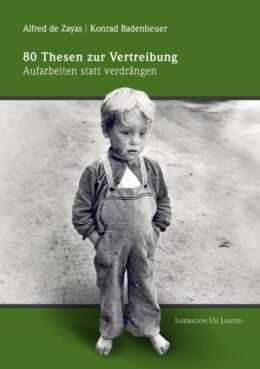Alfred de Zayas and Konrad Badenheuer
80 Theses on Expulsion – Coming to Terms with the Past instead of Repressing It
Paperback, 216 pages, with 15 illustrations, including three maps, in German
ISBN 978-3-945127-292
14,90 €
One in four Germans has family roots in the vanished, “old” East Germany, i.e. in Silesia, Pomerania, East and West Prussia or the Sudetenland. The forcible uprooting of some 14 million people from these regions after the Second World War is a watershed in German history and has changed the map of Europe. And yet there has been silence about this event. For a long time, the media and school textbooks have reported little about it, and ignorance is the result. Only a small percentage of young people in Germany can even find Silesia, once a thriving German region twice the size of Hesse, on the map.
This book sees itself as an antithesis to repression and forgetting. It is an appeal to take note of the historical facts, to evaluate them correctly in terms of international law, and then to draw con-clusions: Even today, with good will, many unjust consequences of expulsion could be overcome. The authors are convinced that all of Europe would benefit from this.
With this book, the U.S. international law expert and historian Prof. Dr. Alfred-Maurice de Zayas has poured decades of research and human rights work for the United Nations in Geneva into 80 theses. De Zayas places the expulsion of the Germans in the global context of a situation in which more than 60 million people are currently affected by flight, displacement and forced migration. For several years now, the United Nations has very clearly advocated the right to one’s homeland as a human right, a development to which Alfred de Zayas has contributed through his scientific publications and at the same time through his work as a high-ranking UN expert, but which has not received too much attention in Germany, of all places.
The book follows a booklet from 2008, the “50 Theses on Expulsion” by Alfred de Zayas, pub-lished by the same publisher and recently out of print in its German edition (the English version being still availabe). The “80 Theses” is, of course, a completely new book, more than quadrupled in size, which takes into account the relevant political and international legal developments of recent years. Compared to the 2008 version, many of the theses of the committed international law expert have been substantiated even more precisely, formulated in a more differentiated manner, and embedded even more broadly in the current intellectual-historical context of Europe. For example, de Zayas shows for the first time how clearly every expulsion also violates the Ten Commandments and Christian ethics in general.
One of the innovations is the co-authorship of the old and new publisher Konrad Badenheuer. In particular, his contributions to the book give the theses an accurate contextualization in the contemporary West German intellectual landscape. The Berlin publicist and journalist with insider knowledge of the associations of expellees explores the question of how the massive repression of the Germans on the subject of expulsion can be explained at all. How was it possible, for example, that terms such as “East Germany” and “East Brandenburg” could simply change their meaning and now refer to different regions than in the past? What did the various federal gov-ernments and those affected themselves contribute to this – certainly fatal from the point of view of those affected – development through their actions? The author provides fascinating answers. He subjects the work of the Landsmannschaften since their constitution around 1950 to a differ-entiated, but in some points almost drastic critique. Nevertheless, his conclusion remains optimis-tic for the long term.
Another contribution from his pen compares the little-known reparation policies of the Eastern European states toward the expellees since 1990. His investigation of the question of how many East and Sudeten Germans died from the consequences of their actual expulsion – especially from hunger-related diseases and lack of medical care – opens up new scientific territory. In a close comparison of several existing publications from different areas of origin and reception, he quan-tifies this loss at just under 3.5 percent of those affected, or about 410,000 people. Previous re-search has ignored this issue, leaving a large white space.
Finally, the book documents important resolutions of the Bundestag and the European Parliament as well as landmark declarations of the United Nations on reparations for displacement. All of these documents are from the 1990s, comparatively recent. In facsimile, the telegram from a Brit-ish diplomat dated August 1, 1945 is reproduced and analyzed, opening up new insights into the expectations and calculations of the British government at the time regarding expulsions. Some maps and photos complete the documentation section.

